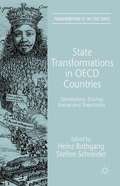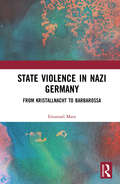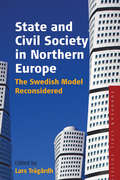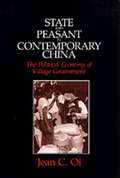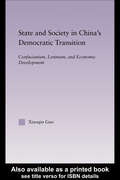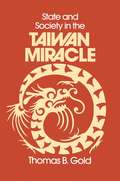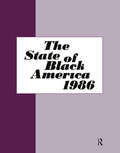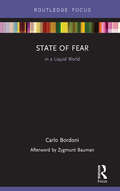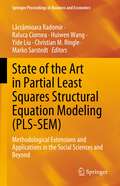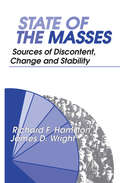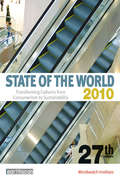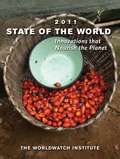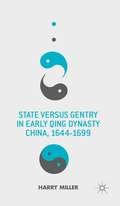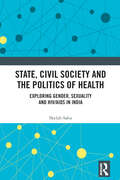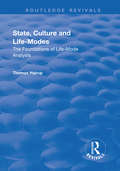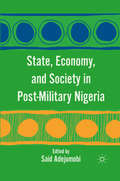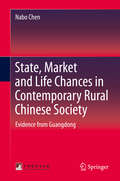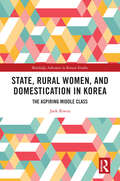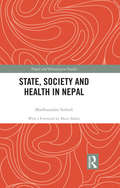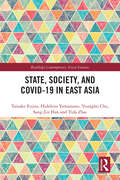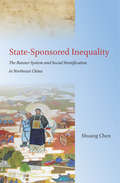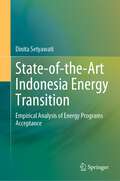- Table View
- List View
State Transformations in OECD Countries
by Heinz Rothgang Steffen SchneiderThe democratic nation state of the post-war era has undergone major transformations since the 1970s, and political authority has been both internationalized and privatized. The thirteen chapters of this edited collection deal with major transformations of governance arrangements and state responsibilities in the countries of the OECD world. A unified conceptual and explanatory framework is used to describe trajectories of state change, to explain the internationalization or privatization of responsibilities in the resource, law, legitimacy and welfare dimensions of the democratic nation state, and to probe the state's role in the today's post-national constellation of political authority. As the contributions show, an unravelling of state authority has indeed occurred, but the state nevertheless continues to play a key role in emerging governance arrangements. Hence it is not merely a 'victim' of globalization and other driving forces of change.
State Violence in Nazi Germany: From Kristallnacht to Barbarossa
by Emanuel MarxThrough analyses of three eventful years in Nazi Germany’s history – the Kristallnacht pogrom, the invasion of Poland and the invasion of Soviet Russia – this book explores the violence of states. All three events were part of the Nazi colonial project and led to mass killings, eventually resulting in the systematic murder of Jews becoming a major war aim – one that Germany would pursue to the end, even when it became clear that the military conflict could no longer be won. Drawing on voluminous historical and sociological literature, as well as documentary and contemporary evidence, the author presents a new account of the phenomenon of extreme state violence as a special category of violence, in which the armed forces, maintained in a state of readiness, are used unnecessarily and excessively, often on thin pretexts, and, unlike coercive violence, only rarely for the purposes of carrying messages to the public. As such, it will appeal to scholars of sociology, history and anthropology concerned with mass and state violence.
State and Civil Society in Northern Europe: The Swedish Model Reconsidered (Studies on Civil Society #3)
by Lars TrägårdhIn the current neo-liberal political and economic climate, it is often suggested that a large and strong state stands in opposition to an autonomous and vibrant civil society. However, the simultaneous presence in Sweden of both a famously large public sector and an unusually vital civil society poses an interesting and important theoretical challenge to these views with serious political and policy implications. Studies show that in a comparative context Sweden scores very highly when it comes to the strength and vitality of its civil society as well as social capital, as measured in terms of trust, lack of corruption, and membership of voluntary associations. The “Swedish Model,” therefore, offers important insights into the dynamics of state and civil society relations, which go against current trends of undermining the importance of the welfare state, and presents autonomous civic participation as the only way forward.
State and Economics in the Middle East: With Special Refernce to Conditions in Western Asia & India (International Library of Sociology)
by Alfred BonneThis is Volume XVI of eighteen in series on the Sociology of Development. Originally published in 1948, this study looks at the Middle East as a society in transition in terms of its state and economics. Written during the early war period, the book covers developments only up to that date.
State and Peasant in Contemporary China: The Political Economy of Village Government
by Jean C. OiCommunist revolutions eradicate traditional power structures, but they do not alter the basic issue of peasant politics: how the harvest shall be divided. Although the revolution removes landlords from the historical stage, the state and its agents appear as newly powerful claimants on the harvest. To a historically unprecedented degree, the state directs the division of the harvest, and this brings it into direct conflict with the peasantry. Before the revolution the harvest was divided in the context of a class relationship, but after the revolution it is divided in the context of an increasingly direct state-society relationship.
State and Society in China's Democratic Transition: Confucianism, Leninism, and Economic Development
by Xiaoqin GuoThis study aims to fill the gap in the existing literature on China's Democratic development, by presenting a comprehensive and detailed examination of the key factors that have created and sustained state domination over society in China.
State and Society in the Taiwan Miracle (Taiwan In The Modern World Ser.)
by Thomas B. GoldExplores the application of constructivist theory to international relations. The text examines the relevance of constructivism for empirical research, focusing on some of the key issues of contemporary international politics: ethnic and national identity; gender; and political economy.
State of Black America - 1986
by Bernard E. Anderson John CalmoreFirst published in 1986. A collection of studies on Black America from 1985 to 1986 inclsuing the economic status, classes, political policies, housing, education and civil rights. Includes a population chart of American Blacks from 1980 to 1984.
State of Fear in a Liquid World
by Carlo BordoniThis book examines the insecurity that besets our lives in the contemporary world, whether as a result of natural disasters, human negligence or, more recently, threats to security in the form of terrorist activity, which itself gives rise to new fears: fear of travel, agoraphobia, distrust of others and existential anxieties. Revealing the connection between the two components of our insecurity, as reflecting on and conditioning human existence, and producing social problems, the author brings this to bear on the notion of security that modernity had sought to guarantee to its citizens – a notion that has slowly crumbled with the crisis of modernity and with the emergence of the "liquid" world. Now insecurity is endemic and has so firmly become part of us as to be accepted as an unpleasant aspect of normality that we must live with. However, the necessity of living in a risk society in which security has emerged as important does nothing to dispel the fear that accompanies us at all times. An engagement with the thought of Bauman that explores fear as an accompaniment to the end of modernity and its assurances, State of Fear in a Liquid World offers developments of the thesis of liquid modernity and will appeal to scholars and students of sociology, social theory and politics with interests in individualisation, social change and (in)security.
State of the Art in Partial Least Squares Structural Equation Modeling: Methodological Extensions and Applications in the Social Sciences and Beyond (Springer Proceedings in Business and Economics)
by Yide Liu Marko Sarstedt Christian M. Ringle Huiwen Wang Lăcrămioara Radomir Raluca CiorneaThis edited volume brings together some of the best papers from the 2022 Conference on Partial Least Squares Structural Equation Modeling (PLS-SEM), held at the Babeș-Bolyai University, Cluj, Romania. The volume seeks to expand the current research on PLS-SEM and promote the method’s application in the scientific community. It gathers research from scholars in many different fields who work on the advancement of PLS-SEM and who apply the method to explain and predict behavioral phenomena. Researchers today can draw on a wide array of different PLS-SEM-based algorithms, complementary methods, and model evaluation metrics. Tying in with these developments, the first part of this book documents methodological advances of PLS-SEM, which extend the researchers’ current toolbox of methods. The following parts demonstrate state-of-the-art applications of PLS-SEM in various fields such as consumer behavior, hospitality, human resource management, entrepreneurship, and organizational behavior. Special emphasis is placed on studies that apply complementary methods to offer a more nuanced analysis of the research questions.
State of the Masses: Sources of Discontent, Change and Stability (Social Institutions And Social Change Ser.)
by James WrightIs the consciousness of Americans in the midst of dramatic transformation? Or do people think and feel much the same as they have always thought and felt? Do most people enjoy their work, or hate it? Is the American family being replaced by new institutional forms, or is it much the same as it was in the 1950's? Have material values been replaced by a "postmaterial consciousness" in a postindustrial society? Are Americans becoming more conservative, less conservative, or staying about the same? State of the Masses asks the important questions.Originally published in 1986, this prescient study evaluate the views of social critics, neo-conservatives, neo-Marxists, post-industrialists, and the theorists of the little man, who puport to describe the nature, social conditions, outlooks, and motivations of the American populace. The claims of one group are often diametrically opposed to those of another. The authors make the case for which claims can be considered true and which false. Hamilton and Wright analyze the contradictory claims and compares their implications with the best social science research and data available at that time. They also explore the implications for theories in light of the conflicting portrait the evidence provides. The authors conclude with a new perspective for understanding continuities and changes in the United States. This is a prescient view of American society during turmoil, and a model for how social science research can be used predictively.
State of the World 2010: Transforming Cultures from Consumerism to Sustainability
by Worldwatch InstituteMany of the environmental and social problems we face today are symptoms of a deeper systemic failing: a dominant cultural paradigm that encourages living in ways that are often directly counter to the realities of a finite planet. This paradigm, typically referred to as 'consumerism,' has already spread to cultures around the world and has led to consumption levels that are vastly unsustainable. If this pattern spreads further there will be little possibility of solving climate change or other environmental problems that are poised to dramatically disrupt human civilization. It will take a sustained, long-term effort to redirect the traditions, social movements and institutions that shape consumer cultures towards becoming cultures of sustainability. These institutions include schools, the media, businesses and governments. Bringing about a cultural shift that makes living sustainably as 'natural' as a consumer lifestyle is today will not only address urgent crises like climate change, it could also tackle other symptoms like extreme income inequity, obesity and social isolation that are not typically seen as environmental problems. State of the World 2010 paints a picture of what this sustainability culture could look like, and how we can - and already are - making the shift.
State of the World 2011: Innovations That Nourish the Planet
by Worldwatch Institute StaffKnown for tackling the most pressing issues that face our world, the Worldwatch Institute has dedicated the 2011 edition of its flagship report to a compelling look at the global food crisis, with particular emphasis on what innovators globally can do to help solve a worldwide problem. State of the World 2011 not only introduces us to the latest agro-ecological innovations and their global applicability but also gives broader insights into issues including poverty, international politics, and even gender equity. Written in clear, concise language, with easy-to-read charts and tables, State of the World 2011, produced with support from the Bill and Melinda Gates Foundation, provides a practical vision of the innovations that will allow billions of people to feed themselves, while restoring rural economies, creating livelihoods, and sustaining the natural resource base on which agriculture depends.
State versus Gentry in Early Qing Dynasty China, 1644–1699
by Harry MillerContinuing the argument developed in the author's previous book, this exhaustively researched study describes the humiliation of the Chinese gentry at the hands of the statist Oboi regents in the 1660s and the Kangxi emperor's self-declared Confucian sagehood in the 1670s, which effectively trumped the gentry's claim to sovereignty.
State, Civil Society and the Politics of Health: Exploring Gender, Sexuality and HIV/AIDS in India
by Skylab SahuThis book provides a comprehensive analysis of the discourse on health in India, examining governance, policies, programmes, and the involvement of the state and civil society in ensuring health for all and especially for people living with HIV/AIDS.The book critically examines government measures to improve healthcare services in India, specifically for disadvantaged groups like the poor and women who face several obstacles in accessing healthcare. It explores various aspects of healthcare accessibility, gender equity measures and strategies implemented by the state and highlights the significant contributions of civil society organizations and activists in shaping healthcare provisions, as well as their influence on the discourse surrounding health and HIV/AIDS. With a special study based on the author’s research on HIV-positive women in Karnataka (a high-prevalence state) and West Bengal (a low-prevalence state), and an examination of government policies, financial allocations, and relevant reports, this book fills a crucial gap in academic literature by offering a comprehensive analysis of health and governance in relation to HIV-positive women, in India.The book will be a valuable resource for students and researchers in public health, policy studies, community health, gender studies, sociology of health and illness, and Indian government and politics. It will also be useful for policymakers in the development of more effective and inclusive healthcare policies.
State, Culture and Life-Modes: The Foundations of Life-Mode Analysis
by Thomas HøjrupThis title was first published in 2003. This book offers a challenging new approach to social theory, building on the concept of life-modes. Thomas Hojrup invites us to look at cultural analysis within a state perspective. He develops a mode of analysis based on principles of structural dialectics inspired by Aristotle, Leibniz, Bachelard and Hjelmslev. In doing so he offers a fresh perspective on classical theoretical problems in both the social sciences and humanities, a perspective which allows us to think beyond some of the dominant paradigms of these disciplines. The book is addressed to scholars from a variety of disciplines who are interested in new solutions to some of the fundamental theoretical problems concerning state, society and culture.
State, Economy, and Society in Post-Military Nigeria
by Said AdejumobiThis book analyzes how neo-liberal state economic policies and political reforms have impacted on state-society relations, economic and class configurations, social composition of power, social welfare and cohesion in post-military Nigeria; and points to key policy recommendations that may be crucial in redirecting the future of the country.
State, Market and Life Chances in Contemporary Rural Chinese Society
by Nabo ChenThis study focuses on the effects of market reform on the life chances of rural people in China. Based on comparative ethnographical evidence from three townships of rural Guangdong province, this book provides a more recent and detailed story about the social inequality in rural China, a further explanation for the institutional analysis on the social stratification of China, a new typology of the developmental results and the changing roles of political elite of rural china.
State, Rural Women, and Domestication in Korea: The Aspiring Middle Class (ISSN)
by Jaok KwonThis book explores the dynamic interactions between the state and society during the industrialization of South Korea in the 1960s and 1970s, focusing on rural women as a marginalized social group.By illuminating rural women’s interactions with the state and their aspirations for entering the middle class, it effectively reveals insights into the gender and class perspectives of industrialization in South Korea. Utilizing an analysis of personal letters from peasant movement activists, documents and periodicals issued by the Korean Catholic Peasant Women’s Organization, as well as in-depth interviews with farmers, housewives, activists of the peasant movements, and governmental officers, this book represents a reconsideration of state-society relations, as well as a reinterpretation of housewife ideology theory.Highlighting the often-invisible experiences of marginalized rural women, this book will be of great interest to students and scholars of Korean Studies, Women’s Studies, and Rural Studies.
State, Society and Health in Nepal (Nepal and Himalayan Studies)
by Madhusudan SubediThis book focuses on health, healing and health care in Nepal. It presents an intriguing picture: the interplay between the natural processes that cause ill health or diseases and the socio-cultural processes through which people try to understand and cope with them. The work places medical tradition, health politics, gender and health, and pharmaceutical business within the wider politico-economic milieu of Nepal. It also describes the establishment of medical anthropology as an academic discipline, and its relevance for understanding the country’s specific health problems, health care traditions, and health policies. Combining scientific research with practical experiences, the book will serve as a unique resource, especially for health workers, policymakers, and teachers and students in medical schools, those in public health, social medicine, health care, governance and political studies, sociology and social anthropology, and Nepal and South Asian studies.
State, Society, and Covid-19 in East Asia (Routledge Contemporary Asian Societies)
by Taisuke Fujita Hidehiro Yamamoto Youngho Cho Sang-Jin Han Yida ZhaiThis book elucidates state-society relations in East Asia during the COVID-19 pandemic from a comparative perspective.Based on the findings of cross-national surveys in Japan, South Korea, and China, the book scrutinizes the dynamics of the state–society relationships in each country, examining trends of change in this relationship during the COVID-19 pandemic. Citizens’ attitudes toward individual freedom, the state’s anti-pandemic policies, vaccine hesitancy, and income redistribution policies across the three countries are compared revealing how public opinion in Japan, South Korea, and China during the COVID-19 pandemic provides a basis for understanding the complex relationship between state and society in East Asia.Transcending national boundaries and uncovering citizens’ evaluations of their domestic and neighboring countries’ pandemic responses in East Asia, this book will be an indispensable resource for anyone interested in East Asian society and politics.
State, society and mobilization in Europe during the First World War
by John HorneThis volume examines political and cultural mobilisation in the face of industrialised mass death during the First World War. Comparing Britain, France, Germany, Italy and Austria-Hungary, it generates arguments on mobilisation and 'total war' which have wider relevance. It explores 'national ideals' which cast the war as a crusade, the inclusive 'self-mobilisation' of sectional identities and private organisations behind national efforts, and the exclusion of suspect groups (the 'enemy within') from the mobilisation process. It also highlights the importance, and difficulty, of assessing the limits of mobilisation as well as the differing capacities of the state to sustain it, factors related to prior degrees of national integration and political legitimacy. Mobilisation in this sense was an important factor which determined the outcome and legacy of the war.
State-Sponsored Inequality: The Banner System and Social Stratification in Northeast China
by Shuang ChenThis book explores the social economic processes of inequality in nineteenth- and early-twentieth-century rural China. Drawing on uniquely rich source materials, Shuang Chen provides a comprehensive view of the creation of a social hierarchy wherein the state classified immigrants to the Chinese county of Shuangcheng into distinct categories, each associated with different land entitlements. The resulting patterns of wealth stratification and social hierarchy were then simultaneously challenged and reinforced by local people. The tensions built into the unequal land entitlements shaped the identities of immigrant groups, and this social hierarchy persisted even after the institution of unequal state entitlements was removed. State-Sponsored Inequality offers an in-depth understanding of the key factors that contribute to social stratification in agrarian societies. Moreover, it sheds light on the many parallels between the stratification system in nineteenth-century Shuangcheng and structural inequality in contemporary China.
State-of-the-Art Indonesia Energy Transition: Empirical Analysis of Energy Programs Acceptance
by Dinita SetyawatiThis book discusses how people can come together to address current energy justice and access poverty problems by examining the relationship between energy systems and society in diverse energy sources. The novelty of this book is that this is the only complete guide for readers who wish to understand the status of Indonesia’s energy transition and renewable energy development. Energy programs that are explored are the ones prioritized by government administrations, including coal, nuclear power, solar energy, green electricity, and geothermal energy. Based on extensive fieldwork and empirical data, the book combines insights from historical data on energy subsidies and economic diversification, current empirical data on social acceptance of new energy technologies, and contemporary studies that forecast the implications of the transition to the coal industry and fossil fuel subsidies. It asks how Indonesia has enacted policies that support energy transition. How do the public and civil society view those policies? What are the implications for broader themes and discussions on energy sources, technology, systems, policies, and service? Strategies are suggested to advance a sustainable transition in the developing world that will mitigate developmental risks associated with the transition away from fossil fuels while encouraging decision making in a sustainable and socially just manner. This book is an informative and engaging read for a general audience as well as a valuable resource for scholars, researchers, and students in environmental and energy studies.
Stated Choice Methods: Analysis and Applications
by David A. Hensher Jordan J. Louviere Joffre D. SwaitUnderstanding and predicting the behaviour of decision makers when choosing among discrete goods has been one of the most fruitful areas of applied research over the last thirty years. An understanding of individual consumer behaviour can lead to significant changes in product or service design, pricing strategy, distribution channel and communication strategy selection, as well as public welfare analysis. This graduate and practitioner guide, first published in 2000, deals with the study and prediction of consumer choice behaviour, concentrating on stated preference (SP) methods - placing decision makers in controlled experiments that yield hypothetical choices - rather than revealed preferences (RP) - actual choices in the market. It shows how SP methods can be implemented, from experimental design to econometric modelling, and suggests how to combine RP and SP data to get the best from each type. The book also presents an update of econometric approaches to choice modelling.
